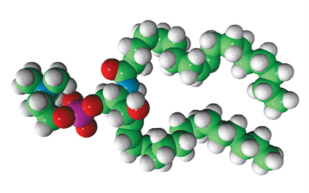Sphingolipids
Sphingolipids are, along with sterols and glycerophospholipids a class of vital lipids and essential building blocks for cellular membranes and vesicular structures. In our research, we study the physiological and pathophysiological role of sphingolipids in metabolic and neurological diseases.
Typically, the synthesis of sphingolipids starts in the endoplasmic reticulum with the condensation of an activated fatty acid and the amino acid L-serine. This first and rate determining reaction is catalyzed by the enzyme serine palmitoyltransferase (SPT). Interestingly, SPT shows a significant substrate variability and can metabolize straight and saturated and but also some branched and monounsaturated fatty acids in the range of C12 to C18. Under certain conditions, the enzyme also uses the amino acids L-alanine and glycine as alternative substrates. This forms a great variety of different sphingolipid structures. Particularly, the use of alanine and glycine instead of L-serine forms a class of atypical 1-deoxy-sphingolipids that are metabolic dead ends as they cannot be metabolized to complex sphingolipids nor degraded by the canonical sphingolipid catabolic pathway. Various missense mutations in SPT gene result in pathologically increased 1-deoxy-sphingolipid levels that can be detected in blood and tissues. 1-deoxy-Sphingolipids are neurotoxic and increased concentrations are primarily harmful to peripheral sensory neurons. Chronically elevated 1-deoxy-Sphnglipids manifests clinically in a progressive loss of sensory perception (sensation of pressure, temperature and pain) and peripheral neuropathy (hereditary sensory and autonomic neuropathy type 1 – HSAN1).


Metabolically, SPT interconnects two pathways, the fatty acids and amino acids metabolism, which is directly connected to the central energy and carbohydrate metabolism. Chronic metabolic disturbances such as the metabolic syndrome (MetS), type 2 diabetes mellitus (T2DM) manifest therefore in an altered spectrum of sphingolipids. We have demonstrated that the spectrum of sphingolipids is altered in metabolic disorders such as MetS or T2DM. Particularly, 1-deoxy-sphingolipids are significantly increased in metabolic conditions, which is relevant for the pathogenesis of the diabetic sensory neuropathy but also in the development of other defects such as insulin resistance and beta-cell failure. We demonstrated that blood sphingolipids are clinically relevant and prognostic biomarkers that help to predict the overall health risk in metabolic disorders and to functionally monitoring the efficacy of therapies.
The overall goal of our research is to gain a better understanding on the role of Sphingolipids in neurological diseases and other pathological changes and to exploit their potential as drug targets and predictive clinical biomarkers in metabolic diseases.
View research group